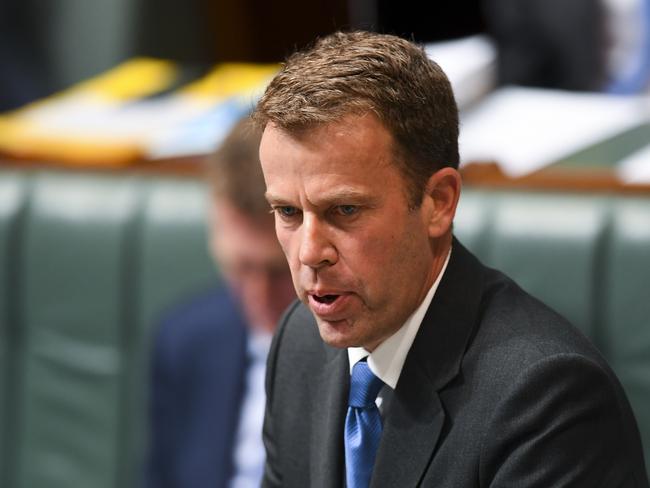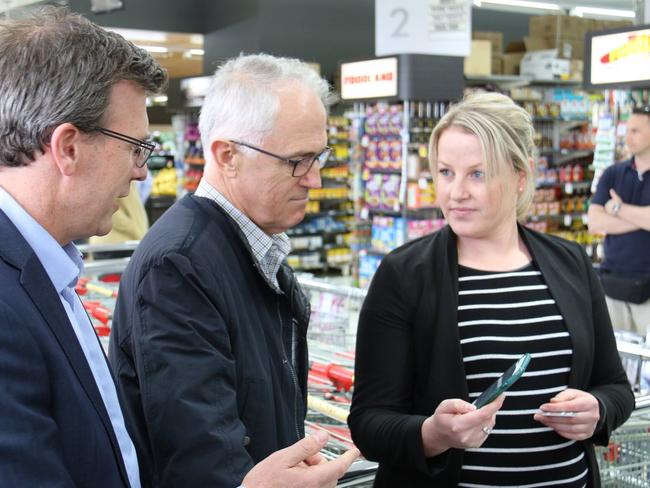Cashless welfare card audit questions ‘inadequate’ evidence, value for money
AUSTRALIA’S $18 million cashless welfare card trial is under fire after an audit brought its benefits into question, with Social Services Minister Dan Tehan rushing to its defence.
SOCIAL Services Minister Dan Tehan has defended the $18 million cashless welfare card trial despite an audit finding there was “inadequate” evidence to prove it reduced social harm.
The Minister says the card — designed to prevent welfare recipients spending money on alcohol, drugs or gambling — is making “a real difference” in communities in South Australia and Western Australia where it has been trialled.
But an audit by the Australian National Audit Office released yesterday has questioned whether the card has actually reduced social harm or whether it was value for money for taxpayers.
It also shows some of the statistics used to demonstrate the card trial’s benefits in boosting school attendance and reducing grog and drug abuse related harm were misleading.

In one case, it says that the department used statistics from September 2016 compared to September 2015 to demonstrate a decrease in St John Ambulance call-outs but the audit found that, accounting for seasonal changes and using data over a longer period, there was actually a 17 per cent increase in call-outs from April to October 2016 compared to the previous year.
It also says anecdotal information reported to the Minister suggested an increase in school attendance.
But ANAO analysis of state data available to the department showed that attendance was relatively stable for non-indigenous students and had actually declined by 1.7 per cent for indigenous students after the implementation of the trial.
It found some data that was used to monitor the trial’s performance was not collected and other data was “not fit for purpose”.
The report found the Department of Social Services “largely established appropriate arrangements to implement the trial”, which quarantines 80 per cent of an individual’s welfare payment on a cashless debit card that cannot be used on banned items, but its approach to monitoring and evaluation was “inadequate”.
“As a consequence, it is difficult to conclude whether there had been a reduction in social harm and whether the card was a lower cost welfare quarantining approach,” it says.
The audit also raised concerns around risk management in the trial and the department not completing a cost-benefit analysis.

Social Services has accepted all six of the audit’s recommendations.
Mr Tehan said a second independent evaluation of the trial, which would fully address concerns around monitoring and risk management, was already underway.
He defended the government’s extension of the trials in Ceduna and East Kimberley, and expansion to the Goldfields in WA, saying it was done based on “strong independent evaluation results and extensive consultation with local communities“.
“Independent evaluation by Orima Research found gambling, alcohol and drug consumption were reduced in Ceduna and East Kimberley. This finding was supported by feedback from service providers and the communities,” he said.
Labor’s Social Services spokeswoman Linda Burney said the audit exposed the high cost of the trials, budget overruns, a lack of effective evaluation and flawed procurement processes.
“The purpose of the trials is to determine whether the card works, and the Government has failed this fundamental policy test,” she said.
“The Government has spent $18 million on just two trial sites, but haven’t ensured this expenditure was properly evaluated.”
She also called on the government to stop relying on the “discredited” Orima report to justify further trials.
Labor has backed an extension of the current trials in the East Kimberlet and Ceduna, but not new trials in the Bundaberg and Hervey Bay region in Queensland or the Goldfields in WA, and not a national rollout.
Ms Burney said the party took an “evidence-based, community driven approach to tackling alcohol abuse and family violence, and reducing social harm”.
Mr Tehan argued the cashless debit card was “making a real difference in the communities where it operates”.
“People are using the cards to pay for every day essential items such as food, clothing and energy bills instead of spending welfare money on alcohol, drugs and gambling,” he said.
Originally published as Cashless welfare card audit questions ‘inadequate’ evidence, value for money


